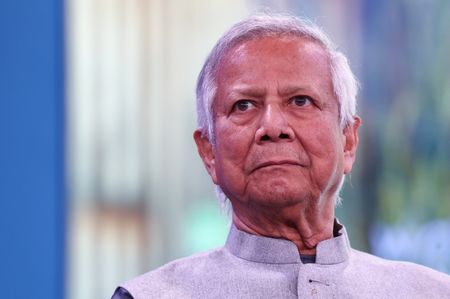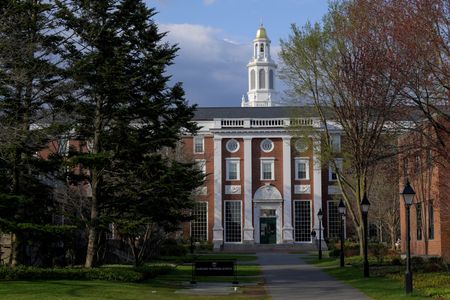By Ruma Paul and Sudipto Ganguly
DHAKA (Reuters) -Bangladesh’s de-facto prime minister has threatened to step down if political parties cannot agree on reforms that citizens await with growing impatience, a top student leader has said, deepening uncertainty in the wake of deadly protests last year.
Nobel peace laureate Muhammad Yunus, 84, took over as interim head of the South Asian nation of 173 million last August after a student-led uprising forced then Prime Minister Sheikh Hasina to flee to India.
Nahid Islam, the head of the newly-formed National Citizen Party (NCP), which wants national elections held only after the completion of reforms, said Yunus was finding it difficult to work without the backing of political parties.
“He was visibly upset,” Islam told reporters after meeting the leader on Thursday.
“He said if he cannot do the work he was asked to do – reform the system and prepare for fair elections – then he may have to leave. He feels trapped between demands from different political camps and growing public impatience.”
Yunus promised major reforms in various sectors after Hasina’s exit, but a lack of progress and growing political disagreement have put his administration in a tight spot.
“We told him clearly that people didn’t rise up just to switch governments, but to change the system,” said Islam, whose party emerged from last year’s student-led protests. “Elections without reform will only take us back to the same problems.”
He gave no further details.
Yunus’ press wing did not immediately respond to telephone calls and messages seeking comment.
With the interim government caught between competing demands for swift general elections and reforms, such a resignation could lead to further uncertainty. Yunus has said the elections could be delayed until 2026.
The Bangladesh Nationalist Party (BNP), led by former Prime Minister Khaleda Zia, has been pushing for polls by December. On Wednesday, BNP leaders said it would be “difficult” to continue supporting the interim government without a firm election plan.
Responding to Islam’s remarks, senior BNP leader Abdul Moyeen Khan called for official corroboration from Yunus’ office, at a time when his government’s credibility was at its lowest ebb.
“I would rather say, the holy wish of the people of Bangladesh is a dignified exit of Dr Yunus (and his) also honouring the trust put by our people on him for organising a free and fair election at the earliest,” he added.
Adding to the pressure, Bangladesh’s army chief, General Waker-Uz-Zaman, also called for elections in December in a speech at Dhaka cantonment this week, expressing his dissatisfaction over the political situation.
Last September, Zaman told Reuters in an interview that elections could be held within the next 18 months.
The registration of Hasina’s Awami League party was suspended this month, effectively barring the party from contesting the next elections.
(Reporting by Ruma Paul and Sudipto Ganguly; Editing by Clarence Fernandez)








